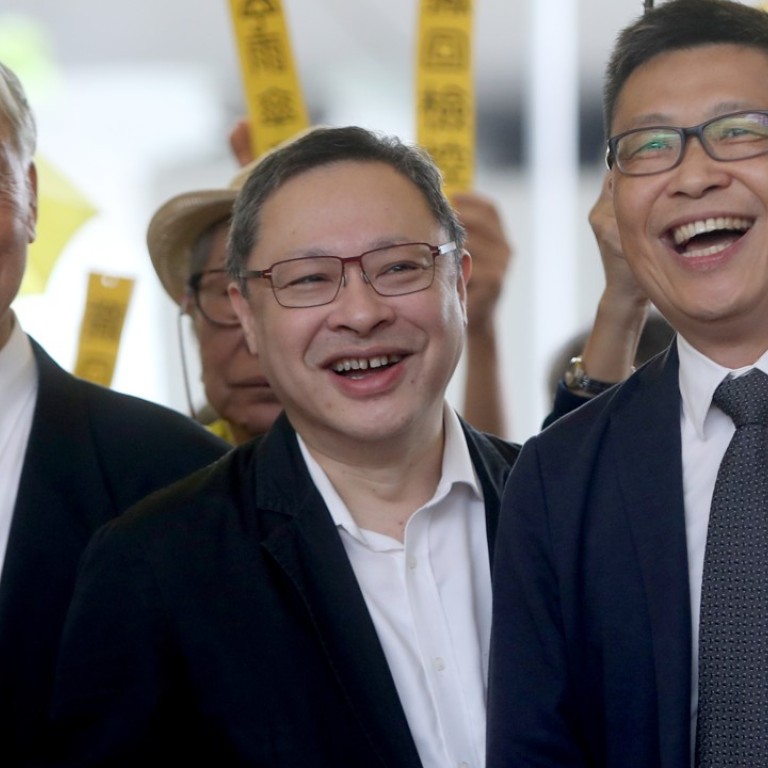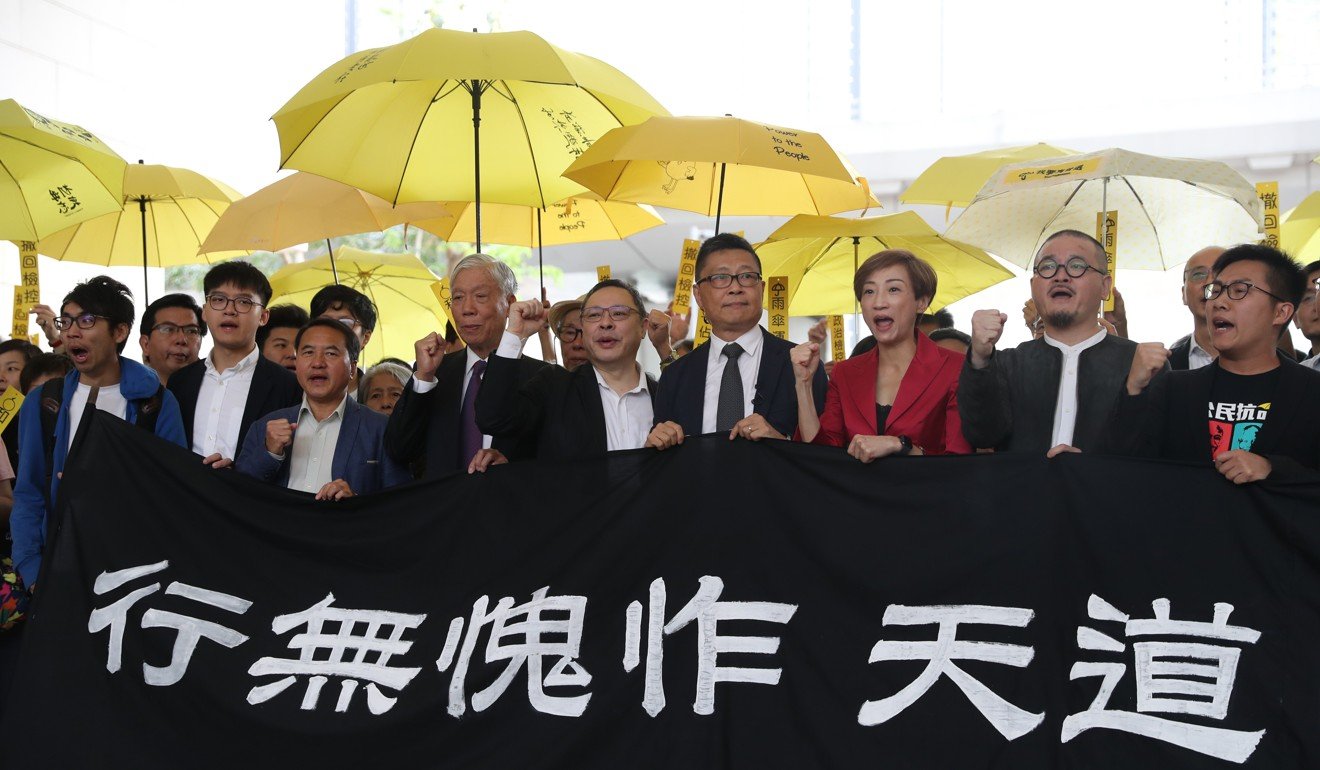
Benny Tai and other leaders of Hong Kong’s Occupy movement used unlawful demonstration in democracy push, trial hears on opening day
- Benny Tai, Dr Chan Kin-man and Reverend Chu Yiu-ming deny three joint counts relating to public nuisance
- Six others also in the dock over protests which brought major roads to standstill in 2014
The three founders of Hong Kong’s huge pro-democracy movement of 2014 mobilised an illegal demonstration to force local authorities to respond to their political demands, prosecutors told a court on Monday.
Opening the case, Andrew Bruce SC said the trio were joined by six other key protesters when organising various unlawful sit-ins – better known as the Occupy movement – at the heart of the city in late September that year.
The three founders were academics Benny Tai Yiu-ting, 54, and Dr Chan Kin-man, 59, as well as Reverend Chu Yiu-ming, 74, who denied three joint counts: one of conspiracy to cause public nuisance; one of inciting others to cause public nuisance; and one of inciting people to incite others to cause public nuisance.
The six others included legislators Tanya Chan, 47, and Shiu Ka-chun, 49, former student leaders Tommy Cheung Sau-yin, 24, and Eason Chung Yiu-wah, 26, and Raphael Wong Ho-ming, 30, vice-chairman of the League of Social Democrats, all of whom faced – and denied – the two incitement charges.
Former Democratic Party lawmaker Lee Wing-tat, 63, denied one count of incitement to commit public nuisance.
Bruce began his speech in Room 3 of West Kowloon Court shortly after the nine pleaded not guilty to the string of charges arising from the 79-day protests sparked by a rigid political reform framework announced by Beijing the previous month. Beijing’s proposal stopped short of granting Hong Kong open nominations in elections for the city’s leader, which the protesters had demanded.
As a result of the alleged offences, three major thoroughfares – Harcourt Road, Fenwick Pier Street and Tim Mei Road, which span the city’s business area from Wan Chai to Central – were brought to a standstill, the prosecutor said.
The choice of the location of Central was calculated to make an impact by creating an unreasonable obstruction in the centre of the city, thereby forcing the authorities to respond to their demands
“A common injury would be done to the public or at least a significant section of the public if those major thoroughfares were unreasonably obstructed for demonstration,” he said, citing the resultant diversions of buses and ambulances.
Bruce specifically asked for his opening speech to be read out in open court, “given the nature of the case”, even though he had submitted a written version to the judge.
The room was packed with journalists and supporters of the defendants. The case was also live-streamed outside court.
Reverend Chu huddled with Tai, Chan and Wong in the dock to lead a prayer before they were asked to plead.
The prosecutor then said the three founders’ roles dated all the way back to March 2013, when they started talking in a press conference about the movement they called Occupying Central With Love and Peace.
From then until September 2014, he said, the trio openly discussed the campaign on various occasions, spelling out their goals while urging people to take part when the time came.
He said the trio clearly intended the occupation to cause public obstruction, in an attempt to advocate their form of universal suffrage.
“The choice of the location of Central was calculated to make an impact by creating an unreasonable obstruction in the centre of the city, thereby forcing the authorities to respond to their demands,” Bruce added.
Hong Kong leader rejects British MPs’ criticism as democracy leaders go on trial
Scattered police-approved protests, led mainly by students, took place two days before what would later turn into mass occupations. And in the early morning of September 28, Tai finally took to a stage to make a declaration.
“Occupy Central formally begins!” Tai said, according to Bruce.
For hours and days to come, Bruce said, the trio, as well as the six others, took turns to call on the public to join the occupations at different sites. Some of them also called for protesters to appeal to their friends to invite them.
After Tai called on others to join the “banquet” – which prosecutors said was a code word for the campaign – Tanya Chan echoed his call on the same day, urging others to take part and deploying the euphemism.

Cheung and Chung asked the protesters to stand their ground and defend their area to avoid dispersal by police, the prosecutor said.
Bruce said Shiu and Chung hosted the demonstration from Tim Mei Avenue, mobilising protesters to “over-cram Admiralty” that day. Wong on the same day mobilised protesters at Lung Wui Road and Fenwick Pier Street, urging them to stay there, according to the prosecutor.
The easiest way to deal with us is to arrest us and send us all to jail
Lee gave instructions to protesters while he was at the junction between Harcourt Road and Tim Mei Avenue, urging them to occupy all six lanes of Harcourt Road, Bruce said.
The prosecutor said the three founders also intended the protesters to carry on with their unlawful action even after September 28.
The prosecutors then played a string of news clips showing the trio discussing the Occupy movement in 2013 with the press in a church and also on a radio show.
In the clips, Tai issued calls for others to join the movement and said if the authorities failed to heed people’s demands for democracy, they would carry out the occupations.
But Chan said it should not amount to obstruction as they told protesters not to fight back when police removed them.
“The easiest way to deal with us is to arrest us and send us all to jail,” he added.
Prosecutors were expected to produce more video footage, which they said formed the backbone of their case.
Speaking outside court, Chan said they contested the case because they wanted to retell the “truth of the history” – that police had used tear gas to disperse peaceful protesters under the rule of former Hong Kong leader Leung Chun-ying.
He said their case was significant because prosecutors were trying to hold them accountable in court for comments made during media interviews, which might have “chilling effects” on the city’s freedom of speech.
Tai responded to a motion politicians had tabled in Britain’s House of Commons to condemn the Hong Kong government over the prosecution.
“The whole world, including those legislators in the UK and people from other parts of the world who care about democracy, human rights and justice, are concerned about the prosecution against us,” he said.
Each charge carries a maximum jail sentence of seven years.
The trial continues before Judge Johnny Chan Jong-herng on Tuesday.

